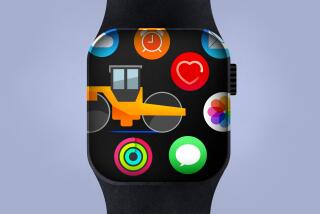Despite Switch, Apple Still Seen as Unique
- Share via
SAN FRANCISCO — Monday’s announcement that Apple Computer Inc. will use Intel Corp. chips in its PCs made the Mac faithful think: different.
After weeks of rumors and speculation, Apple Chief Executive Steve Jobs told software engineers at the company’s annual developer conference that Intel microprocessors would power Macintosh computers beginning next year, with Intel inside all Apple computers by 2007.
The move ends a long and sometimes stormy relationship between Apple and IBM Corp., which builds the Mac’s current PowerPC chips, and Motorola Inc., which makes chips for Apple laptops. Intel supplies most of the chips that power PCs running the Windows operating system of Apple archrival Microsoft Corp. So closely aligned are Microsoft and Intel that they often are referred to as Wintel.
So to some of Apple’s Macolytes, the new alliance portended something sinister for the Cupertino, Calif.-based company that has leveraged the success of its iPods to boost sales of its stylish but expensive PCs.
“Where does this lead us?” Jobs asked from the stage. Before Jobs could answer himself, someone in the audience cracked, “Down the road to hell.”
Despite sentiments like that, computer industry analysts and many Mac users discounted the long-term effects of the change, saying Apple has built its reputation on software and design rather than the raw computing power of its machines. By switching to Intel, they said, Apple may be able to cut prices on its computers and compete more directly against low-cost sellers.
In wooing Apple, Santa Clara, Calif.-based Intel can claim the prestige of supplying one of Silicon Valley’s most finicky customers, but the financial benefits will be relatively small. Intel is the world’s largest chip maker, and Apple is one of the smallest major PC makers, with just under 4% of the market.
For its part, Armonk, N.Y.-based IBM has already focused its energies on building chips for the video game industry. Its chip technology will power next-generation game consoles from all three of the major game companies: Microsoft, Sony Corp. and Nintendo Co.
On a generally flat day on the financial markets, Apple shares fell 32 cents to $37.92, Intel dropped 16 cents to $27.17 and IBM lost 79 cents to $75.
Jobs described the switch to Intel as the third major transition for Mac computers since the company was formed in 1976. The other two were the initial switch to PowerPC chips between 1994 and 1996 and the move to a new operating system, OS X, between 2001 and 2003.
The change was fueled by a desire “to make the best computers going forward,” Jobs said, noting that he promised high-performance desktop and laptop models two years ago that never materialized. “We envision amazing products we want to build for you. But we don’t know how to do it on the future of PowerPC.”
He did not cite IBM by name, but Apple reportedly had been frustrated by IBM’s inability to develop a chip that could process immense amounts of data without overheating. Intel, by contrast, touts its cool-running chips that consume less power.
But just because the chips are the same, differences will still exist between Macs and other PCs. Most noticeably, Apple will continue to promote the virtues of its operating system, which is widely viewed as more stable and secure than Windows even if it runs a fraction of the programs.
“This is not a clone play,” said Jupiter Research consultant Michael Gartenberg. “OS X won’t run on a Dell or HP machine. Will someone come up with a hack to do so? Absolutely. But the OS X installer will not allow it to work on a non-Apple machine that’s not from Cupertino. But I can imagine Microsoft creating an [application] where you push a button and get OS X, and push a button and get Windows.”
Change does not come without risk. When Apple switched to PowerPC chips, its market share fell to around 5% from 8% to 10%, said Insight 64 consultant Nathan Brookwood. After the computer maker introduced the OS 9 operating system, its share fell to less than 3%. “Going to Intel’s ... architecture, they could end up in the 1% range,” he said.
Paul Hershenson, president of Pasadena-based software developer Art & Logic said that although the change might seem strange, he predicted that few would even remember it in a few years.
“Apple has always been the alternative company,” he said. “They’re the ones who don’t feel corporate. They’re the nonconformist computer company. That’s always been the vibe.... So moving over to Intel processors just seems like a conformist thing to do.
“I suspect that most people will react the way we did. At first, they’ll say, ‘That’s freaky!’ But we have a lot of faith in Apple. People who have strong reactions, I think they’ll settle down pretty quickly.”

![Monrovia, CA - November 06: Original Apple-1 "NTI" motherboard and an Apple Cassette Adapter (ACI) in an original ByteShop Apple-1 koa wood case with Datanetics Keyboard Rev D [keyboard dated: Sept 21 1976]. Morgana Blackwelder with Hand-built Apple-1 displayed for auction at John Moran Auctioneers on Saturday, Nov. 6, 2021 in Monrovia, CA. (Irfan Khan / Los Angeles Times)](https://ca-times.brightspotcdn.com/dims4/default/ab3eeec/2147483647/strip/true/crop/2393x1600+4+0/resize/320x214!/quality/75/?url=https%3A%2F%2Fcalifornia-times-brightspot.s3.amazonaws.com%2Fee%2F8c%2Fa8b37d02425890021cfcd2b29c00%2Fla-photos-1staff-868241-me-1106-apple-first-unit-005.IK.JPG)



